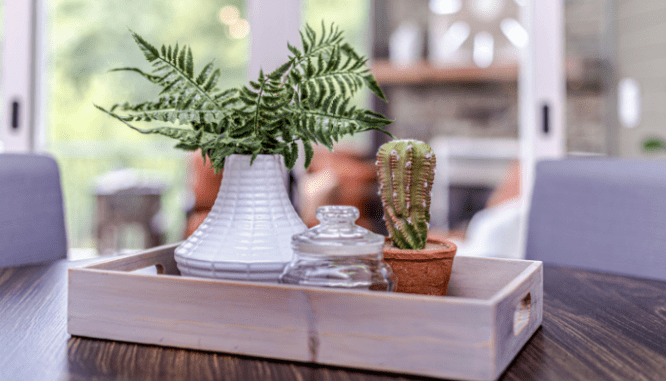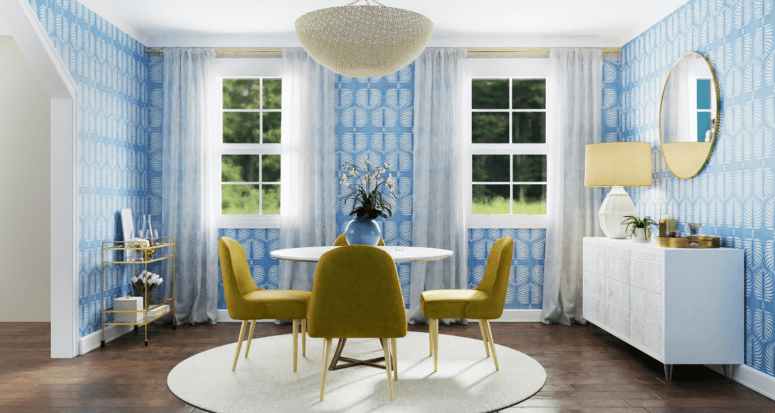What Happens At an Open House? We Explain the Process for Buyers
- Published on
- 16 min read
-
 Kim Upstill, Contributing AuthorClose
Kim Upstill, Contributing AuthorClose Kim Upstill Contributing Author
Kim Upstill Contributing AuthorKim enjoys using her experience as an interior design consultant, picky renter and tiny home builder to help buyers and sellers deep dive into their next dream home project. Kim is currently based in Chicago IL where, when she is not going to open houses or admiring the architectural wonders of the city, she can be found at home avoiding the weather with tea and a good book.
-
 Amber Taufen, Former Managing Editor, Buyer Resource CenterClose
Amber Taufen, Former Managing Editor, Buyer Resource CenterClose Amber Taufen Former Managing Editor, Buyer Resource Center
Amber Taufen Former Managing Editor, Buyer Resource CenterAmber was one of HomeLight’s Buyer Center editors and has been a real estate content expert since 2014. The former editor-in-chief at Inman, she was named a “Trendsetter” in the 2017 Swanepoel Power 200 list, which acknowledges “innovators, dealmakers, and movers-and-shakers who made a noteworthy impact over the last year” in real estate, and her assessment of revenue and expenses at the National Association of Realtors won a NAREE Gold Award for “Best Economic Analysis” in 2017.
We’ve all walked past an open home in our neighborhood and thought, “what does that look like inside?” Maybe the bolder among us (or those on the actual housing hunt) have walked inside to take a peek. Open houses can be fun. They are a great way to snoop on a neighborhood, show your home to multiple interested people at once, or if you’re an agent, to meet the neighbors, buyers, and curious strangers interested in your listing. But if you’re not sure what to expect at an open house, then you might feel daunted by this step in the real estate process.
There are different questions you’ll want to ask based on your position in the market. If you’re a seller, you might wonder if an open house (which comes along with a lot of cleaning and decor critiques) is even worth your time. If you’re an agent, then you might wonder how likely an open house is to turn into a sale, and what its benefits are if it doesn’t … and if you’re a buyer — well, you might just wonder what the heck is going on, and how to navigate around all these other interested people!
Whether you’re a buyer, an agent, or a seller, we’ve made a list especially for you about what to expect at an open home.
I’m not gonna try to hunt you down, I’m not gonna beg you to call me back and tell me whether you want to buy the house or any others. I’m gonna leave you alone! I think if buyers really are just coming to be nosy and they’re not serious, let the agent know that.
 Chris Slinker Real Estate AgentClose
Chris Slinker Real Estate AgentClose Chris Slinker Real Estate Agent at Berkshire Hathaway HomeServices Metro Realty Currently accepting new clients
Chris Slinker Real Estate Agent at Berkshire Hathaway HomeServices Metro Realty Currently accepting new clients
- Years of Experience 17
- Transactions 478
- Average Price Point $131k
- Single Family Homes 426
What to expect at an open house for buyers
Getting there
If you’re a buyer you’re in luck- you’ve already got the easiest job, just show up and attend! In most cases, no appointment will be necessary for an open home, and you can simply plan to show up prepared with some knowledge of the do’s and don’ts of attending an open house.
Sign in
Even though you won’t be expected to create an appointment, you will be expected to sign in when you get to the open house. In most cases, there will be a sign-in sheet — or, if they’re going for a high-tech approach, an iPad — where you’ll be expected to enter your name and contact information.
This process is generally an honor system; agents will be busy showing the house and won’t be peeking over your shoulder or checking your IDs. But please don’t take that as an invitation to provide false details. As Chris Slinker, an agent with 14 years experience in Milwaukee, told us;
“I know Mickey Mouse or Donald Duck are not walking through my open house. A lot of times people will fill in fake emails, fake names, fake numbers.”
Giving a false name is the oldest trick in the book, and can give you a sense of anonymity if you’re just browsing — but providing a real name respects the sellers’ wishes to know who was in their home. Besides, providing your real name doesn’t cost you anything; no one is going to force you to buy a house you can’t afford, or email you to condemn you for looking around.
“I’m not gonna try to hunt you down, I’m not gonna beg you to call me back and tell me whether you want to buy the house or any others. I’m gonna leave you alone! I think if buyers really are just coming to be nosy and they’re not serious, let the agent know that,” says Slinker.
If you’re just browsing, telling the truth might just get you what you want — an unbothered, guilt-free walk around a stunning home.
No shoes, no service
Just like visiting the home of a friend or family member, it is important to respect the wishes of the seller when entering their home. While dinner jackets or black ties aren’t formalities you’ll need to worry about, do pay close attention to rules regarding shoes and masks.
If you are asked to take off your shoes, it is not because you are a dirty human who can’t be trusted, but it’s more a numbers game — imagine you have dozens or even hundreds of unknown guests walking through your home in one day. You’d probably want to minimize the amount of vacuuming to be done once they leave, too! Be courteous and, if requested, park your sneakers at the door.
As pandemic life evolves, so does mask protocol and social caution around public health. Everyone has their own take on safety, so to satisfy all parties, if you’re asked to view with a mask on, please respect the wishes of the host and mask up.
If you want to wear a mask while inside an open house when it is not strictly required by the seller or agent, you are fully within your rights to be as masked as you wish to be! No one will fault you for being too cautious … and an N95 can be a fun way to hide your open mouthed look of horror at the sticky, un-renovated kitchen cabinets.
Knock knock …
Knowing who is going to be showing you around a home is key to knowing what kind of questions to ask them. In the case of an open house run by an agent, the person showing you around the home will be the listing agent, not the seller or homeowner. Come prepared to ask lots of excellent questions — you’re dealing with a professional.
In addition to the agent, there will likely be other people in the house when you arrive in the form of other prospective buyers. If you are attending an open house out of casual interest, be sure to let the agent know you are not in the market — this will allow them to turn their attention to other clients who might be more serious about buying the property, which leaves you free to poke around to your heart’s content.
Looking around
An open house can be a boom or bust for an agent. Sometimes the events are packed full of interested parties — and sometimes there’s only a trickle.
Use your (excellent) powers of observation to understand which category the open house you are attending falls into. If it is bustling inside, then give people their space, don’t crowd — and probably don’t expect to get a personalized tour from the agent. If you are interested in the house, you can make enough contact with the agent to make your interest known. If things progress, you can set up a private viewing or phone call outside of the open house circus.
As you are moving through the home, you can open drawers and closets, check out storage space, and keep an eye out for signs of dampness or smells of smoke — but know where the line is between due diligence and privacy invasion. Truly off-limits areas will likely be clearly marked, so don’t sneak past any clear signs, and certainly don’t force any locks.
If you need to know what is behind closed doors ask the agent — they will certainly be able to tell you and might even be able to accompany you for a guided peek!
Documentation
It’s an excellent impulse to wish to keep notes or records of homes you visit. Doing this will stop houses from combining in your head and allow you to reference what you liked or didn’t like about particular properties. Look up advice about having your house hunting checklist ready, and feel free to add your own criteria (where is the closest ice cream shop?).
Consider what tools you might want to bring to the open home. Notes are great, but there are some etiquette rules for what kinds of notes to take. Even though a camera is just a click away on your phone — always ask before taking pictures. The same goes for taking measurements — it’s great that you want to see if your four-poster California King waterbed will indeed fit in the main suite … but before you get down on hands and knees and whip out your tape measure, ask permission from the agent.
The great news is that a pencil and notepad are always in style, the listing probably has pretty decent photos, and measurements can generally be provided upon request if you’re getting serious about the house.
The walls (might) have ears
Maybe you’re viewing a house with your friend and are simply bursting with the impulse to crack a joke about the excessively ugly carpet. Or, in a rosier turn of events, you’re viewing a home that you can absolutely see the potential in, given a coat of paint and the destruction of a dividing wall or two. Either way, and even if the agent doesn’t seem to be within hearing distance, remember that you’re in a private home and (ahem) other people might be listening.
Whether the listening occurs in the form of a smart speaker, security cameras, or simply a nearby couple who agree with your renovation vision and can win in a bidding war … it’s best to keep your thoughts to yourself until you’re safely on the street or in the comfort of your vehicle.
Speaking of bursting — remember that bathrooms in open homes will generally be off-limits for their usual purposes. Avoid having to rush out of a promising home because nature calls, and plan your hydration and relief schedule accordingly.

For sellers
Model behavior
If you have decided to have an open home at your property, it’s likely that you’ve talked through the process and know generally what will happen.
Knowing and seeing are two very different ways of believing, and we urge you, if possible, to attend other people’s open house events in the area to get a feeling for the process.
Since you likely won’t be attending your own open house (sellers being present is generally not recommended), visiting someone else’s will let you see how professional, crowded and (sometimes) boring the reality of an open home can be!
Make a date
Schedule a time and date with your agent well in advance. This will give you a goal to work toward, an ability to organize your day to not include going home, and time to get rid of that questionable couch.
Scheduling early will also allow your agent time to prepare themselves and promote your home across various channels, setting you all up for the best chance at success.
Paper trail
You want people to be entranced by the qualities of your property and prepare them to love the, um, quirks. To convey the important information about your home (and to give prospective buyers something tangible to refer to while looking at your property), consider creating a property description sheet.
This sheet can be handed out at the open house and should include information about the highlights and features of your home. Some writing tips: hook them with a punchy headline, use positive language, and be detailed but brief.
If you have inspection documents, consider offering copies of these as well. This can give prospective buyers a more realistic picture of your home and show that you have nothing to hide.
It is likely that if a buyer chooses to move forward they will want to do an independent inspection to confirm the results, but offering your documents can still feel like a gesture of goodwill and honesty — and who doesn’t love that!
All dolled up
We know you’re intending to trim the lawn and deep clean the kitchen sink. Aside from these little touch ups, commit to making bigger cosmetic repairs to truly make your house shine.
Paint is always a big one, and a new coat (inside and out) can go a long way. But don’t stop there! Turn a cosmetic eye to the floors, bathrooms and kitchen — are there small things like dirty carpets, outdated equipment, and peculiar smells that can be addressed?
Ask your agent or your stylish BFF what could be done to give the home a facelift. If you’ve lived in the house for some time, you may be a little blind to its flaws — a fresh set of eyes can be almost as important as a fresh coat of paint!
Less is more
You want to emphasize the spacious feel of your home and give buyers the ability to move about freely — especially if more than one or two parties are in the house at one time.
Consider removing a decent amount of furniture to give your home the breathing space it needs, but don’t strip the place entirely. The trick is to make the rooms feel like a domestic space without the clutter of actual daily life — somewhere between brimming and barren should do the trick. Think “pared down”; think “beautifully sparse.”
There are, in fact, people who devote their entire working life to making homes look their best — they’re called stagers. If you know your own taste is not appreciated by the general public, or if you’ve always been more interested in function over form, staging could be a great option for your open house.
Clean up everything, everywhere
Clean like your sale depends on it, because in many cases it actually might! People don’t want to peer through the dirt and muck of your life to see your home’s potential — they want the potential to reach out and slap them in the face!
“Do your best to make the house presentable as possible” advises Slinker “Sometimes we make jokes and say ‘make sure the house is Tinder-ready.’”
We’re not just talking a cursory vacuum and surface wipe; we’re talking scrubbing the grout, washing the floors (consider a professional polish), sprucing up the exterior, and cleaning the windows to a sparkling, blinding brilliance.
Roll up your sleeves and deal with the dirt, or hire a highly rated service to do it for you. Whatever route you take, put your home’s best, most manicured foot forward, and give buyers an opportunity to imagine the well ordered tidy lives of their dreams.
Get out and stay out
It’s a strange thing to have strangers in your home. It’s even stranger to imagine those strangers examining and discussing the merits (and demerits) of your house without you inside of it.
However hard it may be, resist the temptation to defend, hover, or eavesdrop during your open home by simply not being present. Absenting yourself will allow your agent to more fully do their job, save you from the annoyance of stranger’s opinions, and add one less body in the home itself.
Your agent will be prepared to update you at the end of the day with how it all went and what to expect next — so take the day off, treat yourself to something nice, and let this part of the show go on without you.

For agents
Dates and details
A big part of your job as an agent is to reassure and communicate so that your client knows what to expect. You’re well aware by now that people have a lot of expectations, opinions, and feelings about the process of selling their homes. Let your experience and knowledge guide them and talk through when an open home would best suit their timelines and needs.
Are there cosmetic or appliance updates that need to be taken care of before showing, or is everything picture-perfect, and are they in a rush to sell? Make sure to have a timeline that accommodates your seller’s needs and sets you both up for success.
Remember to bring up open home options that your seller might not be aware of, such as pre-recorded digital tours or virtual walkthroughs. Especially in a time of limited social contact, digital outlets can be great ways to reach more people and ensure public health and safety during the proceedings.
Material matters
The list of marketing materials you’ll need is not short, so get working as early as you can! Prepare flyers and MLS posts that reflect the (incredible! Sun soaked! Brilliant!) aspects of the home.
Work the social media channels, including (but not limited to) Facebook, Instagram, and Nextdoor to help post the home all over the internet. Consider paying for boosted ad space and post content consistently to work with the algorithm for optimal visibility and hype.
Early bird gets the worm
Arrive early. Simple but effective, always arriving early means you are never caught rushing at the last minute, scrambling with the keys, or remembering what light switches go where. Arriving early allows for the best cool and collected you ready with unlocked doors and a crisp sign-in sheet for the first walk in.
Before the open house, make sure you’ve had a conversation with the seller and agree on what spaces of the home will be “off limits.” Strike a balance between allowing the seller the privacy they want and giving buyers a clear idea of what they will get.
This might mean compromising on closet access or allowing people to peek but not enter certain rooms. Emphasize to the seller that the fewer locked doors and closets, the more transparent the house will feel to interested buyers.
Whatever the agreements, make sure they are established ahead of time, and before the house opens, allot some time to doing a check of the off-limit spaces to ensure that the buyers (and you) don’t get any unexpected surprises!
Watchful eye
Part of your role is to guide the public through a generally private space, and that space comes with its own rules. Try to find a balance between conveying the needs of your sellers and allowing people freedom and time to form their own opinions.
Not everyone arrives at an open house with the intention of buying or behaving themselves. Learn to spot the simply curious and the possibly mischievous, and prepare yourself to be both welcoming and firm. If the rules are no shoes, mandatory masks, or no photos, be ready to kindly establish (and re-establish) those rules with everyone present.
Slinker warns that open homes can feel like a big bust as an agent if there is low attendance, or if people show up but don’t seem truly interested. He urges agents to remember that even if the house doesn’t garner offers, the connections you make with prospective buyers and community members can still be valuable.
“It’s a huge potential opportunity for [agents] to meet clients that are interested enough to at least look at the house. I tell many of my agents stories about when I started how I had met people at open houses and sold their homes years later. It was only because I met them and kept in touch.”
Keep in mind that the broader picture of connection and community can pay off, even if it’s not an immediate win.
Wrap up, move back
Once the open house is over, allot yourself a little time to walk through and make sure that everything is back in its staged place.
Chairs may have gotten moved, or appliances could have been scooted to one side. If your visual memory isn’t great, it can help to snap a few pictures on your phone before the house opens just so you know how things are supposed to look at the end of the day.
Follow up and pass along
Now that the house is over, the sign in sheet is your best friend! Ignore the clearly fake signatures or emails (no, there’s not a domain for @geemail.cone) and follow up with buyers to learn whether they have any questions.
Both after the open house and during your follow-ups, make sure you’re keeping the seller informed and included as they trust your guiding hand through a long (and sometimes challenging) process.
Conclusion
Whether you’re a buyer, seller, or agent, open houses come with their own sets of rules. Allow our sets of guidelines to inform your expectations and goals, play your part, and the process will be as fun and rewarding as possible.
Header Image Source: (Spacejoy / Unsplash)
